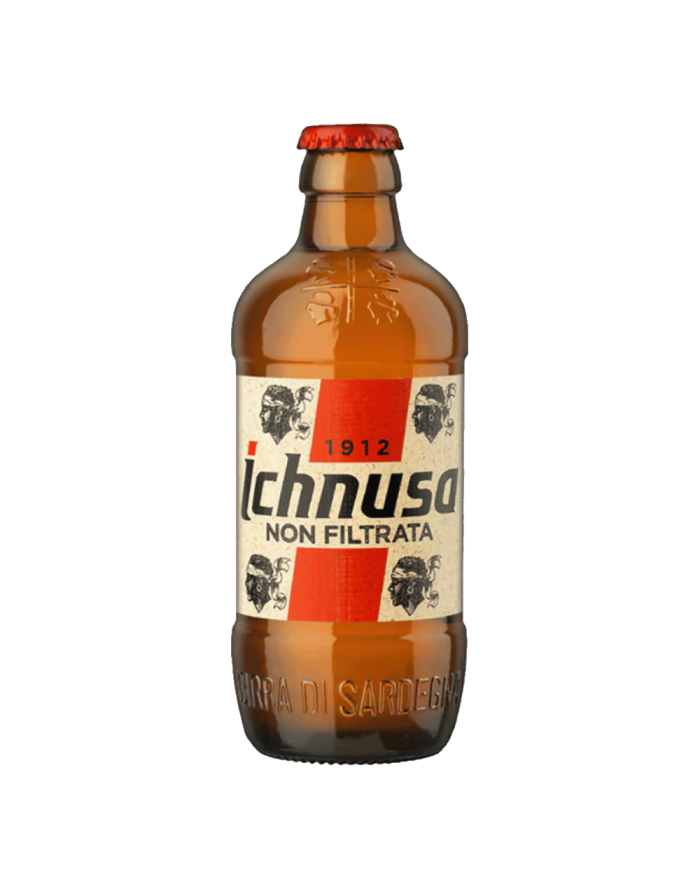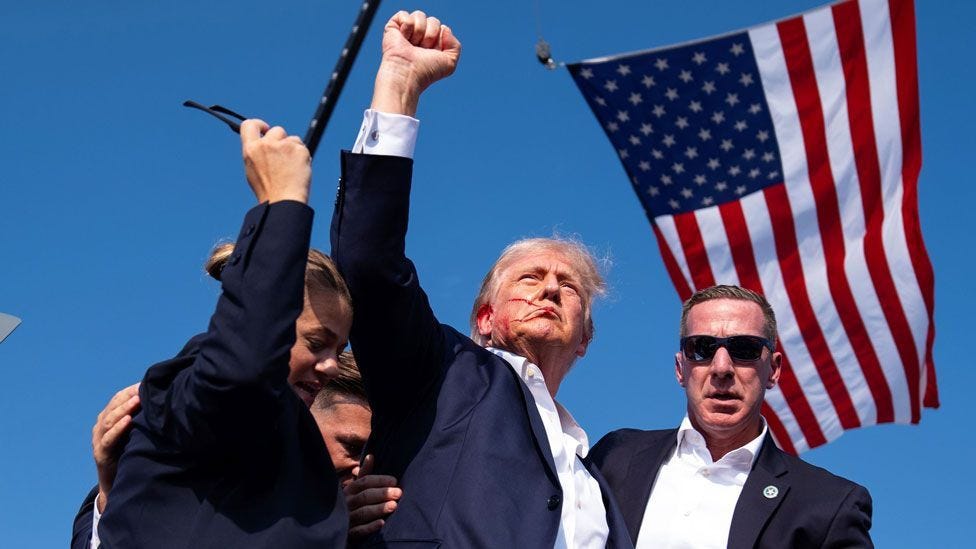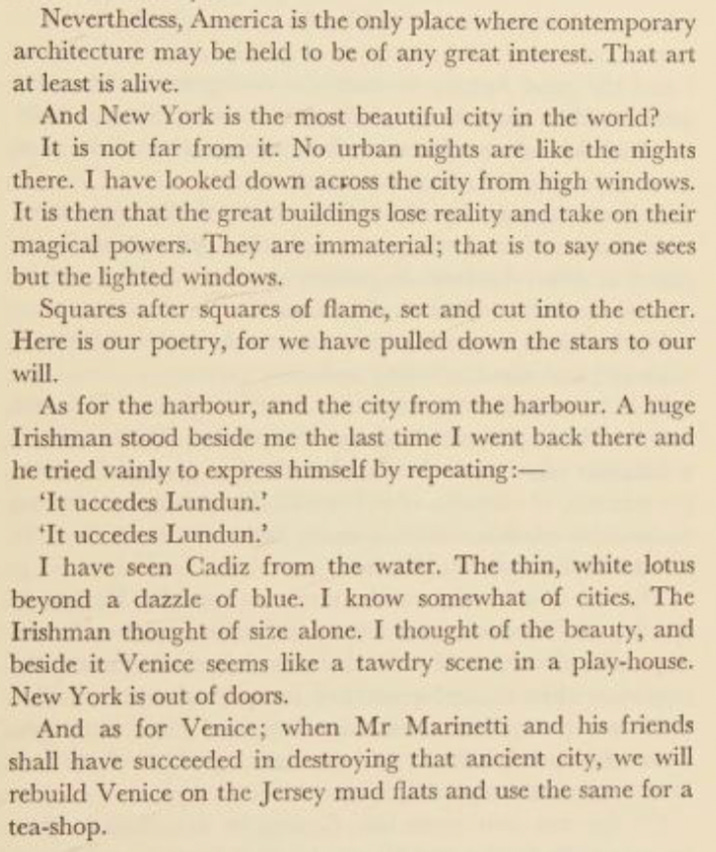Patria Mia
A revelation
Four moors face west and wink, wayward sons of mores no more, the cross crissed by the brand. Heraldry haggled to logo and past blood to barley. Four faces emancipated and their suffering sterilized…
Ichnusa bottles are more fun to look at than they are to drink. There is something damn fine about those four heads, a swashbuckling aura out of time, a whiff of adventure and the open sea. How peculiar that this heraldic motif, the moor’s head, shows up on both Sardinias star export and the papal insignia of the last Pope. The last remnants of a fading age, a more gallant Aunt Jemima.
In my left hand a baby blue pack of stale American Spirits, forgotten and then found at the bottom of a backpack, and in my right, the cold bottle of a Birra Ichnusa. I figure this is as good a comparison as any to try and tease out some underlying sympathy or coherence between the soul of the American, and that of his Italic counterpart.
Observe: Both of us employ the silhouettes of slain savages to sell our narcotics. The American with the Injun and the Italian with the moor.
Already differences arise. The American had the nerve to wipe out his first civilizational enemy, and then the nostalgia to remember him as a mystic and a sage. A cruel and yet romantic sensibility that fills me with a strange surge of pride. While the Italian’s conflict with the moors never ended, and depending on who you ask, is ripe for a resurgence. The moors on the beer bottle are but a vestigial holdover of a regional nationalism. Sardinian nationalism. A sense of national consciousness a bit more hardy and harder to snuff out than say… Virginian identity.
The moor heads on an Ichnusa filtrata have about as much to do with Saracens as Ratzinger’s stemma. But the American will see the Medicine Man staring down at him from behind the counter at 7/11 and thinks he’s picking something a little more natural than a pack of Marlboro Reds. He may experience a subconscious and irrational suspicion that smoking such a product will put his soul in touch with Pow Wows, smoke circles, and Feathered Crowns. While the Italian grabs an Ichnusa to take a sip of Sardinia. In this sense, both products promise an escape into regional exoticism. The difference: Sardinians drink Ichnusa, but I’ve sure as shit never seen a Cherokee suck on Spirits. Then again, I don’t know many Cherokees.
The brand name “American Spirit” comes from a Hegel quote. Like most things American, there is usually something hideously high brow hiding behind the bullshit. Hegel was supposedly asked by a student what the Spirit of America was. He replied, “Tobacco.” If we take the Teuton’s pithy statement seriously, it would mean the American Spirit is now dead, or at the very least repressed to hell. Thankfully, regardless of any congressional bans, we can always still export the stuff.
Italians enjoy complaining about the Americanization of Italy. How American pop culture has infected their national nervous system. I think this is fair, but I have too much pride to allow such statements to go unchallenged. I threw this back in the face of an Italian once, “But what of the Italianization of America? What about your assault upon our shores in the 19th century?” He looked down and paused for a moment, before responding, “Those were Sicilians. Take it up with them.”
Italians have a peculiar relationship with my nation. Their perception of American shores is a star-studded Fata Morgana, conjured up by the chaotic magus behind daytime television. A fairy castle continent full of skyscrapers and square-jawed athletes. Italians will go study abroad or work in America, and then return two years later as a disillusioned cultural revanchist, demanding in perfect English their due pound of flesh from every American who has the misfortune of crossing them on the street. Such debts are usually paid in marriage proposals or membership with the PCI.
Sometimes distance can foster clarity. In other instances, it blinds completely. For the better part of half a decade, I have watched my nation from across the Atlantic with a dispassioned curiosity.
I have never been embarrassed to be an American. And yet, I have never felt a particular connection to my nation either, but I would certainly never admit to such a sin in the presence of Europeans. My countrymen confuse me. I always felt like a foreigner among my own people. It was not that I ever considered myself something as disgusting as “refined” or “cultured,” in fact, I much preferred fraternizing with the men of more rambunctious social classes. At least when I had been drinking, and I was always drinking.
But now in my sober moments, I understand that the solace I found among stranieri never stemmed from any innate cosmopolitanism— the communication barrier between the other and I was but a comfortable veil, another latticed screen to preserve myself. The anonymity of mutual misunderstanding. And as any expat knows, a suitable curtain for confession—for foreign soil is shryvers soil.
Maybe I just shunned my countrymen out of fear of being understood. Which I guess at the end of the day is pretty damn American.
Americans are obligated to optimism. Italians are not. When Americans exchange pleasantries they follow a strict code.
“I am having an amazing day.” - I am having a good day.
“I am having an okay day.” - I am having a bad day.
“My day is going okay.” - My family was just murdered in front of me.
There is a tremendously purgative comfort in responding to a “Come Va?” with a blunt “va malissimo!” Who would have thought honesty could be so cathartic?
Italians have to learn restraint when they learn English, while Americans have to learn to let themselves go if they ever hope to master Italian.
I could continue with some more pithy and useless observations, and maybe they wouldn’t be so useless, but you are probably wondering where I am heading with all of this.
Last Saturday I was forced into drinks with a Frenchman. Socialist sort, but intelligent enough for me to enjoy the conversation, and therefore show some restraint in matters of opinion. I rather liked the guy, and we discussed everything from French historiography to Near Eastern politics. But immediately before I got up to leave, he shot me a question that knocked me off guard. He asked me about my country.
Normally when a European asks a question about America, it’s not really ever a question at all, and more an excuse to fire into an explanation. Sometimes the explanation is a denunciation of some aspect of American culture or foreign policy, and other times a weird form of apologetics. But it’s always them explaining something about America, and very rarely is there an actual question involved, a question that expects an answer.
He asked me with visceral sincerity what I thought was in store for my nation.
Maybe it was the half dozen negroni cocktails in my blood, or maybe it was something more inexplicable, but I left him with a grave warning. I told the Frenchman that my country was a powder keg, and its fate would be decided in the next couple of months. I told him that if they arrest Trump, or if they are so audacious as to kill him, the country would erupt into a conflagration of violence that would burn the world along with it.
Around half an hour later I was on a bus heading home, and I checked my phone.
And I saw the news, and I saw the picture.
A torrent of emotions mangled my mind, my limbic system full of lightning, for a moment I thought I was drowning.
“TRUMP SHOT.”
“TRUMP SURVIVES ASSASSINATION ATTEMPT.”
“NEVER SURRENDER.”
A fear mingling with ecstasy, triumph, and anxiety, I searched around to the figures beside me, like a drowning sailor thrown overboard. I wanted to scream “LOOK, LOOK YOU FOOLS, LOOK WHAT HAPPENED!”
But nobody was looking at their phones, nobody was panicking. Nobody was screaming with joy.
And I realized that they had no reason to care. This bus full of Romans, Morrocans, Bangladeshi, and every other manner of men, but no Americans. Why should they care?
It was in that moment, that the thunderous revelation struck me. It was at that moment, that I remembered who I was. I was an American.
And so I picked up my phone to call another American. And we screamed and shouted as the bus looked on in scorn at this half-drunk foreigner making a fuss over God knows what.
The next day I went to go watch the EuroCup final with a friend. It was nothing like the last EuroCup. I had ended the night of the last final dancing on the roof of a truck, surfing the electric paroxysm of energy that was unleashed on that city with Italy’s victory. I was so invested in the games that summer, the summer of 2021. I stood up and shouted the Italian national anthem with my friends before every game, linking my soul with the nation I lived in. But in my heart, I knew it was dishonest. During the tournament in 2021, I would look at the Italians in my periphery when they would score a goal or sing their nation’s songs, and see that ancient ecstasy flash from their faces, a pride and a love. Something transcendent, religious even. The same expressions etched into Bernini’s marble saints. A fire that I would never know. And I felt as a voyeur. A filthy voyeur.
But on the night of the EuroCup final of 2024, I had a different feeling in my heart. And during the taxi ride home I could not stop thinking about something odd. A friend of mine, Leo, had recently made a curious statement on a podcast episode. In the movie Casablanca, during the scene where they play La Marseillaise, many of the extras display such emotion because they were French exiles themselves. And they were filled with a sense of patriotism and tragedy when they heard that anthem, knowing their country had lost its sovereignty and its status. And I wondered if my own anthem could kindle the same temperature of emotion.
And I sat in the empty piazza outside my house, listening to the hatred of the crickets fiddle, a symphony just as familiar to the banks of the Shenandoah as it was to the Tiber. And I thought I could just as easily be in Harpers Ferry. And so I pulled out my phone and put on the Star Spangled Banner.
I listened to that anthem, my anthem, for the first time in many years. And I felt the swelter of tears well up upon my cheeks, comingling with a sense of hope and a sense of fear. And I reckoned it was a damn fine anthem. Just as harrowing as Scipio’s helmet, or the impure blood that waters French fields. And I mulled and marveled over the fact that I was an American.
Two inches. Two inches away from the death of a dream. Lincoln did not move his head in that theater. Kennedy did not turn in his Lincoln Continental. But some stroke of Providence preserved the life of Donald Trump.
I think I owe my consciousness as an American to Donald Trump. In 2016 I liked him because he made evil people mad. I latched on to the man, partially in secret, because he was this great reaction to the schoolmarms of the nation. This righteous jester who was raising hell. But a few years ago my outlook on the former star of the Apprentice changed. He transformed in my mind from an avatar of American discontent to a figure of hope. He gave my nation a face. My support for him became less cynical and more sincere. As I watched his movements from across the ocean, I began to remember my connection to my native soil. And when the bullet skimmed his ear, I for the first time realized without a hint of irony that I was an American. And damn proud of it.
I believe in America. Even if I despise many of my countrymen. But I share the belief that Pound held in 1912, “The thesis I defend is: that America has a chance for Renaissance and that certain absurdities in the manners of American action are, after all, things of the surface and not of neccessity the symptoms of sterility or even of fatal disease.”
A flash of green lightning has lit me lately, a revelation from the depths of my soul. Not a suspicion— but a certainty— that the first American has not been born yet. America is not about to fall, she is just entering into the pains of her own labour. The American ideal is finally awakening in the minds of men, a vision for the future and what it can be. Is this a prayer or an intuition? I do not know. When they say, “America is an idea, something to strive for.” They are right for the wrong reasons. They do not understand what that idea is— what it could be. But this destiny, this risorgimento, is contingent upon the next couple of months, maybe years. And at least we know some angels are on our side, in a way alien to Lincoln or Kennedy.
I think upon the American character, and I realize we must guide it ourselves. To stop trying to discover America, and instead create it. To harness all the cruelty and romanticism of our forefathers. Those men who slew the savage and then mourned him as a mystic.
No country but America could have produced the code that one finds, first, all about one and later, when one takes to reading anthologies, in Emerson’s verses, ending:
When half-gods go
The gods arrive.
For the American character to truly express itself again one day, the nation must trim the fat. (I fear a dietary metaphor is too heavy-handed). A certain covert policy or atmosphere of eugenics must be conjured up again. Calvinism is eugenic. The frontier is eugenic. And in a certain time and place, the Italian catholic city-state was the eugenic locus of the cosmos.
We can have eugenics without Darwin or Dejarnette. Without the forced sterilizations of the sanitarium, or the laconic kicks off the cliff. A cultural, spiritual, and artistic hygiene. Cut the welfare and tinker with immigration. For immigration is not the problem, but who we let in. Maybe send some of our best and brightest into temporary self-exile, into foreign cultural capitols, like the days of old. So they can get a fresh look at their nation, from atop the marble bones of another. And they can tinker and compare, and breathe in a bit of shryvers air. For we need to be honest with ourselves. We need a brutal honesty. A cruel honesty.
I despise stagnation, I despise stillwater—death to pond scum. I will not sit idly by and abide an algae bloom in my nation’s soul. We need a well-placed rock to disrupt the pond.
I guess my greatest fear is that the purest spirit of this nation, the character that once was or maybe the character that could one day be, will vanish in a pitch of silent smoke. For there be divers sorts of deaths…
What I’m getting at is this: a man must recognize where he comes from when he goes abroad, and such travels must always be to collect something to serve his nation’s benefit. The lens from which I view my nation has been tempered by the balmy Roman climate, and I think it has made my sight a little sharper. For when the founding fathers formulated the American nomos, they looked to the seven hills upon which I now sit. I believe these ruins and the people that inhabit them can still teach us a thing or two.
If we insist on exporting the American spirit across the world, lets make sure that spirit is celestial and benign. A house cleaning is in order, and while Trump is not a Napoleon, he is something akin to an American John the Forerunner. Lets make damn sure no Herods order his head on a plate.
Those two inches were a sign. A divine proclamation that providence is still behind us. There is much more I have to say, but I will end it with a passage from Mr Pound, an American patriot who spent his life in European exile, but a patriot through and through.
A man who believed that within the American city, an ancient fire slumbered and spoke.



